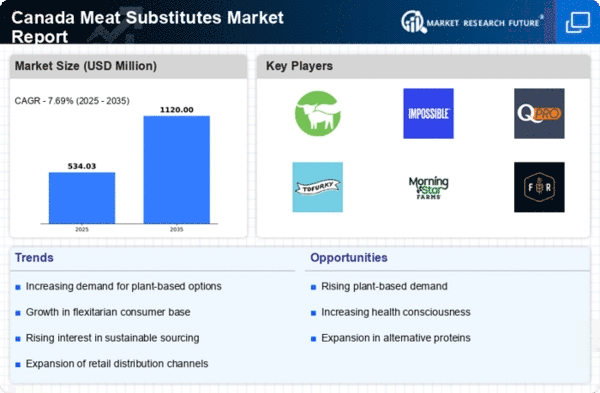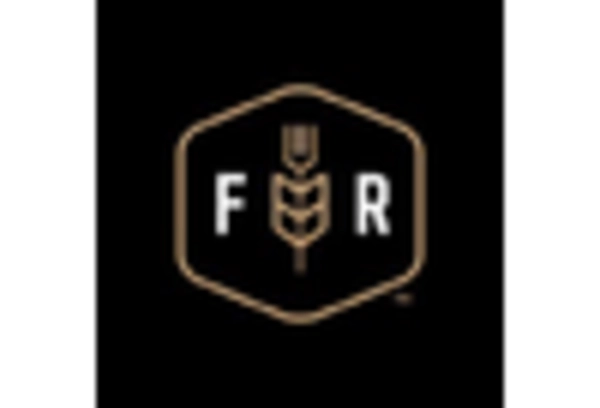Rising Plant-Based Diet Adoption
The increasing adoption of plant-based diets among Canadians appears to be a pivotal driver for the meat substitutes market. A growing number of individuals are opting for vegetarian and vegan lifestyles, motivated by health benefits and ethical considerations. According to recent surveys, approximately 30% of Canadians identify as flexitarians, indicating a significant shift towards reducing meat consumption. This trend is likely to bolster the demand for meat substitutes, as consumers seek alternatives that align with their dietary preferences. The meat substitutes market is thus positioned to benefit from this dietary evolution, as manufacturers innovate to provide diverse and appealing options that cater to this expanding consumer base.
Government Support and Policy Initiatives
Government initiatives aimed at promoting sustainable food systems are playing a crucial role in shaping the meat substitutes market in Canada. Policies that encourage plant-based eating and provide funding for alternative protein research are likely to stimulate market growth. For example, the Canadian government has introduced programs to support agricultural innovation, which includes funding for the development of meat substitutes. This support not only enhances the visibility of plant-based options but also encourages consumers to explore alternatives to traditional meat products. As a result, the meat substitutes market is expected to thrive in an environment that fosters innovation and sustainability.
Environmental Awareness and Climate Change
Environmental concerns are increasingly influencing consumer choices in Canada, particularly regarding food consumption. The meat substitutes market is experiencing growth as consumers become more aware of the environmental impact of meat production, which is associated with high greenhouse gas emissions and resource depletion. Reports suggest that livestock farming contributes approximately 14.5% of global greenhouse gas emissions. As Canadians seek to reduce their carbon footprint, the demand for sustainable food options, including meat substitutes, is likely to rise. This shift reflects a broader societal movement towards sustainability, positioning the meat substitutes market as a key player in addressing climate change through innovative product offerings.
Technological Advancements in Food Production
Technological innovations in food production are transforming the meat substitutes market in Canada. Advances in food technology, such as improved extraction methods and fermentation processes, are enhancing the quality and taste of plant-based products. For instance, the development of lab-grown meat and mycelium-based alternatives is gaining traction, appealing to consumers seeking meat-like textures and flavors. The market for meat substitutes is projected to reach approximately $1.5 billion by 2027, driven by these technological advancements. As companies invest in research and development, the meat substitutes market is likely to see an influx of novel products that cater to evolving consumer preferences.
Changing Consumer Preferences and Demographics
The evolving demographics and preferences of Canadian consumers are significantly impacting the meat substitutes market. Younger generations, particularly millennials and Gen Z, are more inclined to experiment with plant-based diets, driven by health, ethical, and environmental considerations. This demographic shift is reflected in market data, indicating that nearly 50% of consumers aged 18-34 are actively seeking meat alternatives. As these consumers prioritize convenience and flavor, the meat substitutes market is likely to adapt by offering a wider range of products that meet these demands. This trend suggests a promising future for the industry as it aligns with the values and preferences of a changing consumer landscape.
















